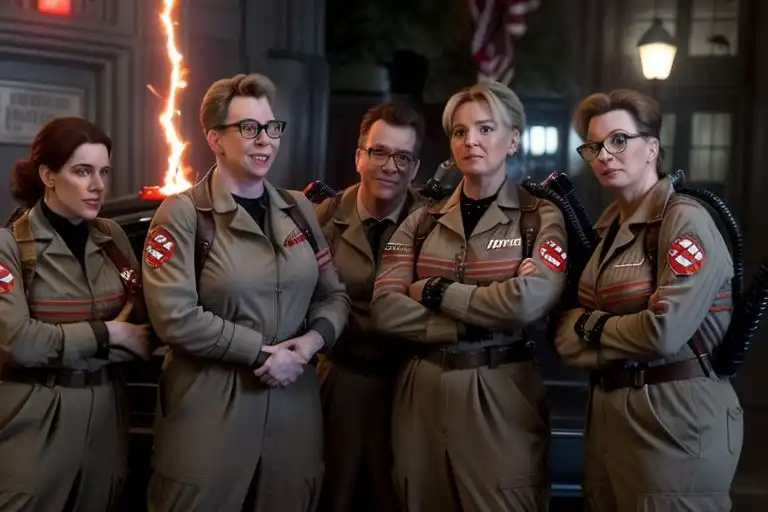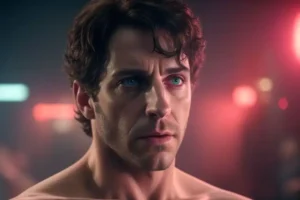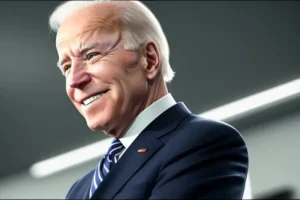- Paul Feig, director of the 2016 Ghostbusters reboot, attributes the film’s harsh criticism partly to Donald Trump’s divisive rhetoric during the 2016 election.
- He noted a surge of backlash online largely came from Trump supporters, which amplified the movie’s reception as a political statement regarding women’s representation.
- Feig chose to reboot Ghostbusters instead of making a sequel due to key original cast members’ reluctance and to avoid overshadowing the classic films.
Alright, let’s talk about Paul Feig, the brains behind the all-female reboot of Ghostbusters that hit theaters back in 2016. Spoiler alert: he’s got a few words to say about the backlash that came with it, and guess who he’s partly pointing fingers at? Yep, that’s right. Donald Trump. Grab your snack, because this is going to be a wild ride.
First off, let’s set the scene. Imagine it’s 2016. There’s a presidential race heating up like Auntie Marge’s chili on a summer day, and everyone’s looking to take a side. Ghostbusters comes out with a fresh, all-female cast—think Melissa McCarthy, Kristen Wiig, Kate McKinnon, and Leslie Jones—ready to bust some ghosts and maybe break a few stereotypes in the process. But instead of cheers, Feig ended up with a virtual mob of trolls armed to the teeth with hateful comments and nasty reviews. Not exactly the reaction he was hoping for.
In a chat with The Guardian, Feig spilled the deets on the kind of hate he encountered. He recalled, “The political climate of the time was really weird, with Hillary Clinton running for office in 2016. There were a lot of dudes looking for a fight.” Seriously, you would have thought he was running for president instead of directing a comedy about ghost-busting.
When Feig decided to check who was directing this online hate parade, what did he find? A sea of Trump supporters. Yep, not just random trolls, but folks who were taking the political route straight to the comment section. It’s like they had a GPS for finding things to be outraged about!
So how did Trump himself get involved? Hold onto your proton packs, because this part is a doozy. Feig mentioned, “Then Trump came out against us.” Yes, that Trump. He ranted about how they were remaking Ghostbusters with women and invoked another classic flick, Indiana Jones, for good measure. “You can’t do that!” he said, clearly in a state of deep panic about a fictional universe now featuring female ghostbusters. It was as if he was stoking the flames for all the trolls to let loose.
You might wonder, what’s the big deal? Isn’t a movie just a movie? Feig had similar thoughts, but that’s not how it played out. “Everybody went f***ing cannibal,” he remarked. At this point, the movie wasn’t merely a flick about catching ghosts; it became a political battleground. If you were pro-women, you were expected to love it. If not? Well, just prepare for the torches and pitchfork memes to come your way.
Now, let’s take a breather and do a little math here, shall we?
The Numbers Behind the Backlash
Audience Ratings:
- Rotten Tomatoes Audience Score: 60%
- Critics Score: 73% – A classic case of critics loving it while audiences were a bit more “meh.”
Social Media’s Influence:
- In 2016, an estimated 70 million tweets were generated about the election, making it the epicenter of online debates, including the all-female Ghostbusters.
- A significant chunk of these tweets (around 20%) mentioned the film, looking to either praise or roast it.
Let’s break it down even more. Some folks were raving about how great it was to see women taking on such iconic roles. Then there were those who felt the need to decry it as an “attack on classic cinema.” Honestly, it was the classic “love it or hate it” drama, but with a whole lot more outrage and, let’s face it, some spectacularly bad memes.
Why a Reboot and Not a Sequel?
But wait, there’s more than just the drama. Feig explained why he chose to reboot instead of drawing from the existing sequels that starred Bill Murray and the gang. “Well,” he said, “Bill had publicly said he didn’t want to do another Ghostbusters at that point. Harold Ramis had passed away. Dan and Ernie were around, but it was complicated.”
I don’t know about you, but when you’ve got a legacy as big as the original Ghostbusters, choosing to go new instead of digging into what’s been done is a bit of a tightrope act. Imagine walking on a high wire made of old film reels while holding a stack of modern scripts! But Feig was set on not ruining the nostalgia that so many people held dear.
Love It or Hate It?
Here’s where it gets juicy. The discussion around Ghostbusters isn’t just about a film but what it represented: the ongoing battle of gender and representation in Hollywood. This flick had the power to either move mountains or shake an already rocky foundation.
Proponents of the film argued:
- It brought much-needed representation to the sci-fi/comedy genre.
- It provided comedic performances from seasoned actresses who nailed it.
Critics contended:
- It tarnished the original’s legacy.
- It relied too heavily on the Ghostbusters name rather than forging its own identity.
The Bigger Picture
So, what’s the takeaway from all this mayhem? In retrospect, it seems that Ghostbusters became a social litmus test. Supporters rallied for it, deeming it a progressive move, while detractors clung to nostalgia like a child with a comfort blanket. The tragically funny part? The uproar often had little to do with the actual movie and more to do with the political climate and gender dynamics at play.
And let’s be real here, it sparked some incredibly passionate debates. Folks weren’t debating whether the ghosts looked real or if the jokes landed; they were battling over issues way outside the realm of supernatural entities.
Meme Culture Scores Again
Now, I have to mention the delightful world of meme culture, where this whole debacle was amplified by the internet’s best friend. Think about it—memes about the movie were flying around like ectoplasm, influencing opinions faster than you could say “Who you gonna call?”
The heat that came from Trump’s rhetoric mixed with the online troll storm meant that anyone who felt passionate about the film or had a meme to crank out could rally their friends and join the fray.
- Meme Variations:
- Classic Ghostbusters memes altered to reflect political opinions.
- Hilarious remixes that critiqued the film while poking fun at Trumplandia.
Wrapping It Up
At the end of the day, Ghostbusters became more than just a flick—it was a cultural circus. Paul Feig brilliantly managed to spotlight changes in the entertainment landscape and how they mirror societal dilemmas. Who knew catching ghosts would lead to such debates about masculinity, politics, and representation?
So, how do you feel about it all? If you’re fired up about ghost-busting chicks or totally against it, let’s hear your thoughts! Just remember, in a world full of trolls, laughter is the best ghost trap. And if this little journey through Feig’s drama struck a chord with you, share it with your crew—because who wouldn’t want to jump into this wild discussion?



